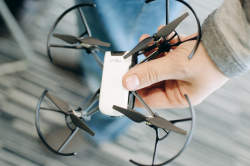The speech
The key global trend right now is a shift from the information era to digital, even though it should have been the other way around. The digital era is the era of data, while the information era is the era of information derived from data. But humanity is moving backwards. Why is this transformation taking place?
Firstly, information storage capacities have increased greatly. Secondly, there are new ways to process unstructured data and derive information from it. Thirdly, performance of computational devices has increased, enabling us to bring the first and second together and create an industry built on data. From the immense amount of data that we generate, we can now extrapolate digital footprints of both people and machines. When we add to this the ability to automatically process data, we start seeing a completely new picture of the world.

Every industry evolves. For example, a company's capitalization can depend on computer performance and information storage methods. The companies that are mindful of technology growth become leaders in their markets. The market is a very conservative place where decisions are made not by geeks or IT experts, but by people responsible for managing money. They’re very pragmatic and it’s hard to persuade them. But they believed in the possibilities of new technologies and started using them. Right now there are no commodity-trading companies in the world’s top 10. The market favors those actively using digital data.
Along with this technological shift there’s also a shift in the business model being used, the foundation of every company. The largest taxi ride provider doesn’t own a single car. The largest home rental company doesn’t own any real property. The largest global media platform doesn’t produce content and the most popular retailer doesn’t have a single store. Of course, I’m talking about Uber, AirBnB, Facebook and Amazon. These companies have completely changed the business models in their market segment.

The R&D that was ridiculed yesterday paves the way today. For example, when the Tesla company started making an electric engine, no one believed that it would work. Now Tesla sells more S-class models in the US that any other automaker. When Elon Musk started working in the space industry, no one took him seriously. Now no one is laughing. On the contrary, people don’t understand how Musk managed to reach such breakthrough results in such a short time. His business models are admired and studied. I asked the head of Volkswagen if they were worried about competition from Tesla. The answer was that Volkswagen is not worried about electric engines – they know how to make them. What they want to know is how Tesla stays afloat, what is the business model of the future? How does demand change and what will it be like in the future?
The people in demand right now are those who know new IT and can adapt it for business. You can call them IT-systems architects. Huge amounts of money are invested in various developments, but often they’re not connected into a unified system. There’re coding experts, system administrators, but it’s hard to find IT architects who can develop business applications. It’s like having a vast foundation and building a hut.

“The winner is not the first to the market but the first to the future,” said the famous business consultant Gary Hamel, professor at London Business School. Sberbank has identified nine key technologies that it plans to develop and apply in its work in the next ten years. They are: artificial intelligence, blockchain, cloud technologies, biometric verification, Internet of Things, virtual reality, gamification, cybersecurity and robotics. We now have research labs for each that focus not only on basic applications, but also on high-level science. We have a separate company, Sbertech, that now employs over 10,000 people. This young and energetic team always welcomes new talent.
Agency for Strategic Initiatives has formed a list of about 200 IT-related professions that will emerge in the near future. Many also say that expertise in machine learning and data science will be mandatory for people in any profession. Everyone will have to be able to understand how it works because it drives any business. That’s why it is crucial not to waste opportunities and learn it while you’re at ITMO University. Also, use the opportunities to learn from large companies. For example, in May we will be accepting applications for summer student internships.

Q&A: on changes in education
Developing educational strategies is up to the Ministry of Education of the Russian Federation. But my opinion is that, considering the international standards, we’re still significantly behind on primary and secondary education, especially when it comes to digital technologies competencies. Children have to learn early on what we talked about: VR, AI, machine learning, and not just get computer classes. When it comes to pre-schools, right now they’re more of a childcare place while parents are at work than learning centers.
Q&A: ICO, blockchain and cryptocurrency
In regards to the hyped blockchain and cryptocurrency tech, it’s an interesting self-funding and self-developing system. Right now we see a community of people who unite to make money, but so far there’s no large investment in this field. No one is against blockchain, but if that’s what you want, you can’t prohibit cryptocurrencies – one can’t function without the other. Initial Coin Offering (ICO) is a slightly different story. It requires gentle regulation by the government because it’s a good instrument for industry and startup development. It will keep on developing, so it can’t just be banned.




